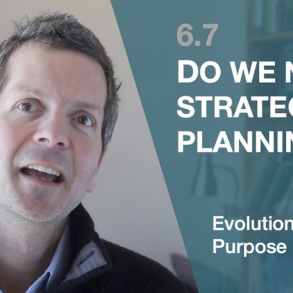By Sally McCutchion and originally published on medium.com
The concept of self-management as a business methodology came to the fore in 2014 when Frederick Laloux published his well-known book Reinventing Organisations.
His theory was that businesses need to embrace an evolutionary purpose, wholeness and self-management to reach a new level of efficacy and sustainability.
Forward thinking business founders and leaders continue to be drawn to this book and to the stories of organisations who have integrated these three pillars and become well-known for their successes.
But despite ten years of community practice groups, consultants, coaches and leaders working with these ideas, the term ‘self-management’ often causes more confusion than clarity.
…Especially within a leadership team or organisation who are taking their first tentative steps.
Back in November, I wrote about how self-management requires us to redefine leadership, not reject it.
This month, I’m delving even deeper into what self-management means, getting real about what’s at the core of many business cultures and how we need to re-build the foundations to truly benefit from what self-management has to offer.
Many Layers Of Culture
The culture of your organisation is influenced by a variety of factors, including:
~ Its size and age
~ The influence of its Founder, CEO or Board
~ The impact of its staff turnover and recruitment strategy
~ Its true values
Every business culture has its own unique fingerprint and naturally, there are positive and negative aspects to how your company’s culture will have developed.
In addition to the unique, internal factors, there is also a broader societal layer of influence. Things like political landscape, economic backdrop, industry trends and even youth culture, music and social media, all add another layer to how people think, behave and relate at work.
And then there’s the deepest layer of all, our human psychology and conscious evolution.
The things we tend not see…
That layer of our own psychology and consciousness is the layer that we tend not to notice.
It’s the layer that brings a huge amount of unspoken context, such as…
~ How does each person relate to and embody their sense of power?
~ What status do different departments and titles hold?
~ How much control do different leaders require to maintain a sense of safety?
~ How much does profit drive the feeling of success?
~ How does the landscape of industry competition impact the speed and wellbeing of the business?
And this is the layer that comes into view when we talk about self-management and makes the shift to self-management deeper and more complex than at first glance.
The Foundation Of Self-Management
At the core of self-management is a shift towards putting purpose, workflow and wellbeing front and centre of your business and this sounds like a fairly simple and desirable thing to do…
But it often rubs up against that unspoken layer of your company culture,
…which can be a major limiting factor in how well your people are able to understand and benefit from self-management.
The hardest thing about understanding this methodology is bringing awareness to those unseen factors. The key is being able to balance our human needs with what it takes to work together towards a common purpose.
We need to be able to recognise the ways in which the individualist and materialistic aspects of society are limiting our progress.
Balancing Conflicting Needs
1. Purpose and Profit
Going unchecked, profit can become the sole driver of what we do. If the focus on monetary gain, either at an individual or business level drives what we do too heavily, purpose will never find its rightful place at the heart of business.
This is the why the first step on a path towards self-management is to re-engage with the true purpose and core missions of what you’re doing.
Naturally, maintaining financial viability will always be important but we have to take a step back from this lever for a short while to bring purpose on board for hearts and minds.
2. Workflow and Status
How the work flows through your business can be heavily influenced by status needs, job title insecurities, and departmental silos. The shadow of these factors is something that we need to be able to look at honestly if we are to overcome how they limit our progress.
When you get to the stage of role mapping your organisation, one of the key parts of the process is to map the work, not the people.
Your people will be brought back into the story but the mindset shift here is to look at how your people serve the work and its purpose, not the other way around.
3. Wellbeing and Control
Creating space for genuine wellbeing at work means relaxing the grip of control. Controlling environments prevent the development of trust, autonomy and relational wellbeing.
When our psychological safety relies on being in control, we stifle the natural opportunities for team development. Shining a light on the ways in which a need for control is impacting your business can be daunting but understanding this part of your company culture is really important.
There is a balance that can be struck between wellbeing and control providing we are willing to explore, learn and adapt.
Is Your Business Ready?
The tools and practices that can be found in every self-management success story are simple and straightforward to learn but to really understand what self-management means, we have to learn how the hidden aspects of your culture need to shift.
Understanding your level of readiness, requires an honest appraisal of the support systems that are needed for this transition:
~ Narrative for the development of emotional intelligence
~ One to one or group coaching practices
~ Legacy of effective change management
~ Strong trust and communication among your core leadership team
~ Champions of business evolution at Senior Leadership and Board level
Bespoke Exploration For Your Business
If any of the factors that pull against people’s understanding of self-management are present within your business, they can be shifted through honest conversation and a strong vision for change.
…
The most important part of your self-management exploration is to look at the deepest layers of your business culture.
This methodology is more than meeting agendas or role maps.
Getting to grips with what self-management really means is critical to changing what you’re able to achieve together.
And Finally…
Jacob Lusk is lead singer of Gabriels and my goodness, his vocal range is something else. Listen to Glory by Gabriels
Republished with author permission.
Featured image added by Enlivening Edge Magazine. Image by StockSnap from Pixabay




